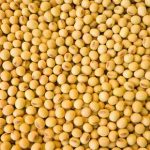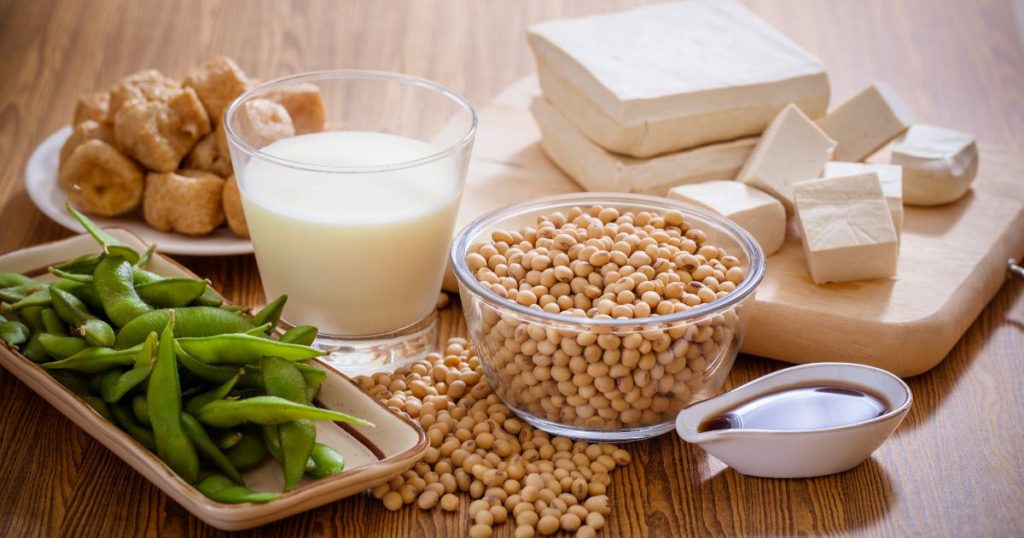 Quality Control Soy Check List
Quality Control Soy Check List
I picked up a December copy of the Chatelaine magazine in a waiting room the other day. I saw an article on soy and decided to read it. This article said it was going to dispel the rumours around soy. It started off saying, ”Soy. One minute it’s the answer to all our health problems, the next it’s a hidden hazard”. The author, Anna Cipollone, pored over the latest research to clear up the controversy. Unfortunately not all the research was accurate. In this article, I’ll discuss Anna’s findings and offer a quality control soy checklist to ensure you are purchasing the best quality product.
Why dispel the rumours around soy?
Soy products come from the soybean, a legume native to northern China. The protein in soy is a ”complete” protein – the most complete you can get from vegetable sources – and just as good nutritionally as animal protein. In fact, with animal protein there is usually more fat and water content. For example a T-bone steak is 19% protein, 43% fat, and 36% water. When you heat animal protein to temperature of 110 degrees over 50% of the bioactivity is lost and you can destroy over 50% of some of the amino acids. Soy is also easier on kidneys than animal protein.
Returning to the article, here are the points that Anna challenged.
1. Soy causes cancer specifically in the breast and prostate.
The part she had right here was to avoid heavily processed soy foods. What she didn’t find in her research was that not all soy foods are created equal. Processing makes a big difference; whenever you cook a food you de-nature it and make it into something different. Depending on the processing, some soy products have lots of isoflavones, some none at all. Isoflavones are the phytoestrogen compounds that are considered antioxidants and prevent cancer.
Commercially processed soy is solvent-washed leaving little nutrient value. For instance, soy sauce and soy oil have no isoflavones left at all. In order to make “textured vegetable protein – TVP for short”, it is put through a high temperature, high pressure steam process that causes the soy to become carcinogenic or cancer-causing. TVP is what is used in soy meat substitutes and should be avoided. Commercial soymilk, soy flour and soy cheese should also be avoided. So if you are ingesting “overcooked” commercial soy, yes it will contribute to cancer cells being formed in the body.
The other soy is cold water washed and very few companies use this method as it is more expensive but leaves the nutrients intact. If you are ingesting a soy product that was processed through a cold water extraction technique, you get the very best of the soybean and all of the positive things like the phytoestrogens which inhibit breast cancer and prostate cancer. The phytoestrogens in soy protect the cell receptor sites from the xenoestrogens and any unwanted estrogenic compounds. So the bottom line is, it is important to ask how soy is processed before ingesting it if you want to prevent cancer.
2. Soy is not heart healthy.
Soy has been proven to reduce high cholesterol levels – often around 10 % – in many studies. Controlled clinical trials have found that 25 grams of soy in the diet daily can reduce levels of LDL cholesterol while maintaining HDL cholesterol. It also prevents plaque formation, slows growth of existing plaque, reduces risk of blood clot formation, lowers blood pressure, and increases elasticity of vessels. In November 2000, the American Heart Association recommended that soy protein be added to our daily diets to help reduce cholesterol and as part of a heart-healthy lifestyle.
3. Soy is genetically modified (GMO).
I know companies that are very picky about their soy protein. They will not use any ingredients that are genetically engineered, though it would cost them less to do so. Call the company to verify if you do not see “non GMO” listed on the label. Usually it will be labelled though.
4. Soy makes menopause worse.
Women who consume soy foods over a lifetime have fewer symptoms of menopause, such as hot flashes, according to studies published in Lancet (1997) and Obstetrics and Gynecology (1998). In preliminary clinical studies, soy increased or maintained bone density in postmenopausal women and alleviated mood swings, reduced hot flashes, sleep problems, etc.
5 & 6. Soy makes you fat and makes your man infertile and busty.
The bottom line here again, is the quality of the soy products you are ingesting. If you are ingesting commercial soy, then you run the risk of the health challenges listed above.
7. Fermented soy is best.
This claim is comparing fermented soy with commercially unfermented soy products. Here is a quality control soy checklist that ensures you have a good quality soy product that will give you the same benefits and more of unfermented soy.
Do not purchase soy products and expect them to produce positive health results unless you know that the following “ESSENTIAL SEVEN” quality controls have been met by the manufacturer:
1. The beans must be organically grown.
2. The beans must NOT be genetically engineered.
3. Each batch must be checked to confirm that it contains the 9 essential amino acids.
4. In the manufacturing process to produce the soy isolate, the crushed soy flakes must be “water” washed (not solvent washed).
5. The anti-thyroid/anti-growth substance MUST be removed. Dr Shaklee discovered this process many years ago.
6. The process must be without high heat.
7. The soy isolate in protein powders must have calcium added (when the oil is removed it becomes an acidic food – when calcium is added it makes it neutral again).
Please contact me if you want to know what I use based on my research.
To your good health!
Charlene




Thank you for this great article. I actually read that same Chatelaine article last month and also thought it was a good article but incomplete in it’s research. Thanks for mentioning the importance of the processing of soy as it relates to some of the “issues” believed to be caused by soy. In fact, this is true in the processing of other foods as well. The closet our food is to nature the better the quality of the food and the nutrients we gain from it. Thanks again for sharing!
So glad you enjoyed it. You are right our processing of food can really make a difference about what, if any, nutrients we actually get from the processed food. Eating as close to nature as possible is the way to go right now. Thanks for your comments.
Charlene
Hi Charlene,
I’m glad my article inspired you to post this. I actually read hundreds of studies on soy and spoke with scientists who have been researching the soybean for the last 20 years, but in the interest of keeping word count down, you’ll never see every piece of research referenced outright in a magazine article. I also outlined that you should be consuming whole soy foods like tempeh and edamame to receive the optimal health benefits as processed foods are never as good for you. Mostly, it’s important that people begin to question what it means to ingest phyto-estrogens – it’s a complex scientific answer that I translated for our readers. Thanks for reading,
Anna
Wow, of all the blogs that exist, you found mine about your soy article. Glad to hear from you. I’d love to connect with you to discuss this issue further. Please let me know if you are interested in exploring further. Charlene
Nice post. I have a question for you. Is making my own raw soy milk healthy. I use a soya milk maker.
Making your own is the best, but only if you are using non GMO soy.
Be well,
Charlene
Do you know where I can purchase soy milk that meets all the criteria?
Thanks!
Hello Tom, Unfortunately there is no soy milk on the market that is manufactured in a way that meets all the criteria.
What I do is get a water washed soy powder that meets the criteria and add water to it to make my own soy milk.
If you are interested in how to get it, contact me at charlene@healthysoul-utions.com.
Be well, Charlene
Hi Charlene…What did you mean by number 5.
the anti thyroid anti growth substance must be removed? Thanks so much for the info!
The effects of soy was first measured in birds which showed they changed foliage and matured very young as well as slowing down the thyroid function. After this observation they realized there was an anti-tyrosine property in raw soy beans. So you want a company who will separate the protein from the raw soy bean through a cold water process and leave behind the enzymes that contain the anti-tyrosine substance.
Another problem is when you cook soy, in order to de-nature compounds like the anti-thyroid substance, then you begin to rearrange the amino acid substance in soy which then becomes a toxic substance. There is a process called a “Mallard” reaction – whenever you cook a food you de-nature it and make it into something different. Basically when you alter and de-nature soy you end up with junk. A few years ago Vegetarian Times ran an article telling their customers not to eat soy products because they are poison. They were referring to the de-natured version of soy products.
Some people today don’t read the fine print to realize there is a difference in soy. Not all soy products are created equally. Many of the soy products and textured vegetable protein products in the stores today produce cancer. So now the news media is highlighting this and they are making a good point.
By using a cold water extraction technique, you get the very best of the soy and all of the positive things like the phytoestrogens which inhibit breast cancer and prostate cancer in men. Do your research and make sure that the soy protein you ingest in only the cold water extracted type. You can reach me at charlene@healthysoul-utions.com if you would like to know where to get the cold water extracted version of soy.
many natural foods are processed to the point that it is not good for your health in the long run. we must stay with whole foods that are keep natural. very informative article.
So true, try to eat predominately the fresh food that will go bad within a week, but eat it before it goes bad.
Hi Charlene,
I am a rep and a consumer of Juice Plus. I know they use the cold water filtration system, however lately are adding more soy to their products and would like some outside opinion on soy. I am curious if your original article still rings true? Should I be concerned with feeding my young girls (4&6) non-gmo, cold water filtered soy? I would love it if you could take a moment and have a look at the website.
Sincerely,
Jill
I am not recommending Juice Plus as their head office cannot answer my scientific questions. So I would not know about whether their protein products would good for children. I don’t recommend any product that cannot answer my scientific questions. There is only one company that can answer these questions so far and that protein would be be good for kids.
Can you tell me what scientific questions you Asked of Juice Plus last year? And if, since then, have received an answer? I find it hard to believe that they wouldn’t answer your questions.
Questions to Ask Nutritional Companies
Your cells can tell if your supplement is real or not. Unfortunately with all the good marketing these days, we cannot tell at first glance if a product is good for us or not. It is important to ask questions that go beyond the hype to see if you are going to get your money’s worth.
Here is a list of questions that have been sent to many companies in North American. Feel free to do your own research. But if you find that you do not have the time, you can ask for the results of the companies presently polled.
1. How much has been spent in research to date?
2. How many full-time research staff does the company employ?
3. Do independent research scientists evaluate new product concepts? If so, who?
4. Does the company have a medical advisory board? If so, who’s on it?
5. Do all product label claims have documented substantiation?
6. Has disintegration time of nutritional supplements been tested?
7. What quality controls are in place on raw materials?
8. What quality controls are in place for product stability during the manufacturing process? (e.g. temperature and humidity)
9. What quality assurance tests are run throughout the manufacturing process?
10. Are all supplements made by your own manufacturing group or are they sub-contracted out? If sub-contracted, what input do you have in quality control?
11. Is clinical testing done on the finished product?
12. Please send a complete bibliography of all research that has been accepted for publication in refereed or peer reviewed professional journals. Is this published research done by scientists employed by your company or those on your advisory board concerning work on actual products being manufactured?
To date these questions have not been answered by Juice Plus. Many distributors have sent them over the last 10 years and still no response. That usually means they can’t answer them. If you are looking for a company who can answer them, let me know if you want that kind of quality.
I am wondering if the anti thyroid anti growth substance is automatically removed using the cold water-washed method.
Yes it is. The product is a Shaklee product with over 100 years of research behind it. Let me know if you want more information on it.
Please tell me a company who can answer all the questions. I sell these products and I need an answer from them if I am sellling it to my people. It, at this point is only in our shake mix. Is it possible for a plant protein shake to be made without soy? I realize that it is high in protein, but would something else be better? I know it is washed and whatever they do next is a cool process. Do you have the list of companies presently polled re questions that you have asked. Thank you so much for all your research and your article here.
The Shaklee Corporation can answer the scientific questions I ask nutritional companies. Feel free to send the questions to Juice Plus yourself and any other company you want to check out. The companies who have received these questions are too numerous to mention and many of them are not in business any more.
Shaklee has a proprietary non-gmo protein blend (sacha inchi protein powder, pea protein, potato protein, vegetarian leucine, and rice protein powder that does not have any soy in it. So there are non-soy versions of protein powders. Bottom line is that if you want to drink a non-gmo soy protein powder, make sure the company can answer the scientific questions before you drink it.